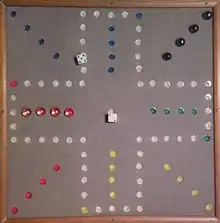Aggravation (board game)
Aggravation is a board game for up to four players and later versions for up to six players, whose object is to be the first player to have all four playing pieces (usually represented by marbles) reach the player's home section of the board. The game's name comes from the action of capturing an opponent's piece by landing on its space, which is known as "aggravating".
 Home made Aggravation board | |
| Designer(s) | Claudia Cruz Garcia |
|---|---|
| Publisher(s) | Lakeside Industries (past) Parker Brothers (a division of Hasbro) (present) |
| Publication date | 1962 |
| Players | 2–6 |
| Skill(s) required | Strategy, Probability |
Aggravation is one of the many variations of the game Pachisi and is based on the older German game Mensch ärgere Dich nicht. It was first produced in 1960 by CO-5 Company. Later versions were made by Minneapolis-based Lakeside Industries, a division of Leisure Dynamic. Today, it is manufactured by Hasbro.
Its distinctive features are that the track accommodates from four to six players, unlike other Pachisi-like games which only allow four; that it is normally drilled to accept colored glass marbles as playing pieces; and that it incorporates "shortcuts". There are no "safe" holes where a player's marbles cannot be captured (or "aggravated", in the game's parlance) other than the player's own base and home sections.
Older versions of the game usually feature an asterisk-shaped board, which is perfectly symmetrical and identical in shape and size from all angles. In addition, older versions allowed up to four players instead of six. However, modern versions of the game produced by Parker Brothers are made in an irregular pattern with a shape that varies for each player, though all players must travel an equal number of spaces in order to reach their respective home sections.
Sequence of play
The game starts with each player placing four marbles in his or her "base". After the order of play is determined through the rolling of the die, each player rolls a single die on each turn to determine the number of spaces to move. All marbles remain in the base until either a 1 or 6 is rolled, which entitles the player to move a marble from the base to his or her "start", the first step before entering the track. While this is considered a turn, and the move takes place in lieu of moving a marble that number of spaces, a six, if rolled, entitles a player to another turn whenever a legal move can be made.
The winner is the first player whose pieces all reach home by exact count.[1] If playing partners when your partner has all their marbles in home then they can roll to help get your marbles home faster,
Shortcuts
The hole in the center of the board is known as the "short cut". A player who is able to land a marble in this location by exact count has the option of taking a route even faster to home. The short cut, though, has the drawback in that it may only be exited by rolling a 1.
Aggravating
A player who lands a marble on a space occupied by an opponent's marble "aggravates" that player's piece and sends it back to that player's base. A player's piece may not be aggravated if it is on an inside corner as these are safe from aggravation. You must land on the space either before or after your opponent.
Players are prohibited from landing on or passing their own marble. If this happens they can not move. If you rolled a 6 then you may roll again. If playing teams, you cannot land on or pass your partner. If, however, there are multiple marbles, you can't jump over or aggravate a marble in the middle or front.
Tournaments
The Unicorn Club has an annual season in which 30 games plus a series of two championship games (total 32 games) are played. Rather than using a board with marbles, a replica of the board is used on a field.
Each color represents a team of 5 players, one of whom is designated as the leader; they wear T-shirts in their respective colors. The four players take the place of marbles; the leader watches, rolls, and makes decisions.
Each team has five home games during a season. Fans of each team, who are usually family and friends of the players, come to its home games and root for the team.
Neutral officials are present at every game, making rulings in disputes.
In team play, the following new rules are added:
- The team finishing first wins the game. But all teams are required to finish.
- The first-place finisher in the previous game gets three bonus rolls. The second-place finisher gets two, and the third-place finisher gets one. Bonus rolls are used following the move of a player from the base to start with a 1. Their use is required when one is available; they cannot be passed up and stored.
- The first-place finisher gets to start the following game first with a player on start rather than on the base. The order is always the same otherwise, resembling the colors of the real board.
- The fifth-place finisher must wait until the first 4 teams have a player freed from the base before being allowed to start.
- The last place finisher must wait until all 5 other teams have started, and at least one team (3 if cursed) has reached the home section (safety).
- If a team has all its players sent back to start (square one), it is considered as if it had already freed a player for the purpose of allowing other teams to start.
- A roll of 5 allows a bonus roll if used to move a player from start to a shortcut (known as "the wheel"). This applies even if it is another team's start. This move is known as a "Hi-Five". Teams have the tradition of holding a player in the start as long as possible, waiting and hoping for a Hi-Five. This is called "Hi-Five ready". Hi-Fives are used to get most players around the board.
- Moving onto another team's start is prohibited unless:
- That team's base is empty
- It is reached by a 6
- There is no other possible legal move
- However, if a player manages to land there by any of the above methods, she or he may remain there as long as the team wishes.
- The super shortcut cannot be used until at least one team has finished. Even then, it can only be accessed from the six spaces from one's own start.
- After five teams have successfully finished, if the final team is unable to make a legal move in 6 consecutive rolls, or fails to finish within 6 rolls after bringing its final piece into home stretch (the last seven spaces before the finish), the team does not finish. It is considered "cursed," meaning that it cannot start the next game until at least three other teams bring a player into safety.
References
- "Aggravation Rules" (PDF). Fgbradleys.com. Retrieved 12 November 2017.
